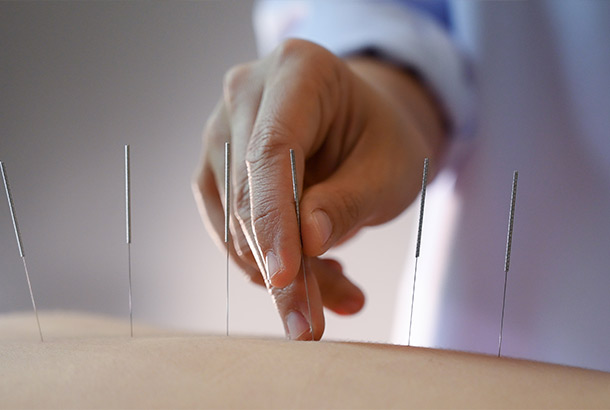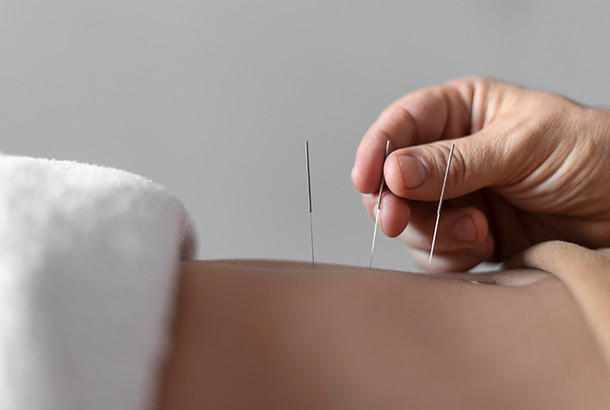Acupuncture
TCM (Traditional Chinese Medicine) Acupuncture can be beneficial on a mental, emotional and physical level. Treatment is focused on specific points along ‘meridians’ of the body where Qi (vital energy) flows. By regulating its flow, the body becomes balanced making acupuncture an effective therapy for wellbeing.
Is acupuncture right for you?
Each year 2.3 million traditional acupuncture treatments are carried out in the UK, making this one of the most popular complementary therapies. People seek acupuncture for a variety of conditions, from chronic illness to part of a health maintenance regime.
Research shows that acupuncture can be an effective treatment for a wide range of conditions such as Allergic Rhinitis, Anxiety Disorders, Chronic Fatigue Syndrome, Depression, Fibromyalgia, Gastrointestinal Tract Disorders, Gout, Headache/Migraine, Hypertension, Infertility, Insomnia, Irritable Bowel Syndrome (IBS), Menopausal Symptoms, Musculoskeletal Conditions, Stress, Type II Diabetes to name a few.


Your initial Acupuncture consultation
Information including current signs and symptoms, full medical history, digestive system, circulatory system, sleeping patterns, diet & lifestyle will be taken to facilitate a treatment plan designed specifically for you.
As part of the overall diagnosis, looking at your tongue in addition to feeling pulses on both wrists will be included.
How many treatments do you need?
The amount of treatments required depends entirely on the condition being treated. Patients are normally seen once a week to begin with. Change is commonly felt by the patient within five or six treatments, although at times just one or two treatments suffice.
As a guide, acute conditions could require only a few sessions, whereas chronic conditions may take longer to improve.
When acupuncture needles are inserted, you may feel a dull ache, tingle, warmth or pulling sensation. All needles are single-use, sterile and disposable.
As points most commonly used are located on the lower arms and legs, it is useful to wear loose, comfortable clothing.

OLD TEXT Other therapies our acupuncturists use include
Moxibustion is prepared from leaves of Artemesia Vulgaris Latiflora and has a warming effect on acupuncture points and meridians.
Guasha Therapy stimulates Qi and Blood flow through the meridians.
Cupping Therapy is used over acupuncture points, meridians, muscles and/or joints to alleviate pain from Qi and Blood stagnation.
Auricular Acupuncture is the use of small acupuncture needles and/or the application of small seeds on ear points.
Tuina Massage stimulates acupressure points, opens energy meridians and stimulates the flow of Qi improving wellbeing.
Electroacupuncture is the stimulation of acupuncture points by a small low frequency electrical current (1Hz) of impulses passing between two needles.
Chinese Dietary Therapy is nutritional advice that supports us as we grow and progress through life requiring adjustments to proportions of various foods, in addition to amounts and variety of foods through the four seasons
Acupuncture FAQ's
No, the needles do not hurt. In fact, most people barely feel anything when needles are inserted. Some people feel a slight pinch, and others ask “Is it in yet?” Acupuncture needles are solid, flexible, and very, very thin (about the width of two hairs).
There are certain sensations associated with the therapeutic effects of acupuncture. These may include slight cramping, heaviness, distention, tingling or electric sensation traveling along a meridian. If any discomfort is experienced, it is usually mild and temporary.
Acupuncture is widely acknowledged as one of the safest forms of medicine. Acupuncture needles are pre-sterilized, individually packaged, and disposable. Acupuncturists undergo extensive training and are regulated by the individual states’ medical board.
One of the greatest advantages of acupuncture is that it has virtually no side effects. Occasionally a small temporary bruise may appear at the site of an acupuncture needle. When compared to the laundry list of cautions and side effects for the average pharmaceutical drug, acupuncture is very low risk!
The frequency of treatment depends on your medical condition. One of the benefits of the payment sliding scale is that allows patients to come in frequently, often two to three times per week.
Many conditions respond faster to frequent acupuncture treatments, while other patients only need to come in once a week. Once your condition is stabilized, you won’t need to come in as frequently. When you come in for your first treatment, we’ll formulate a specific treatment plan for you.
Summary of the therapies our acupuncturists provide
- Moxibustion
- Guasha therapy
- Cupping therapy
- Auricular Acupuncture
- Tuina Massage
- Electro Acupuncture
- Chinese Dietary Therapy
Unsure if Acupuncture is right for you? Get in touch using the form or call one of our clinics to speak with us
Corsham Clinic: 01249 248392
Swindon Clinic: 01793 978270
Melksham Clinic: 01225 704883
London Clinic: 0207 315 4262

